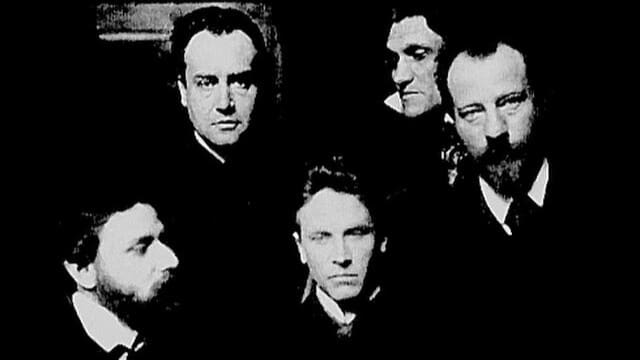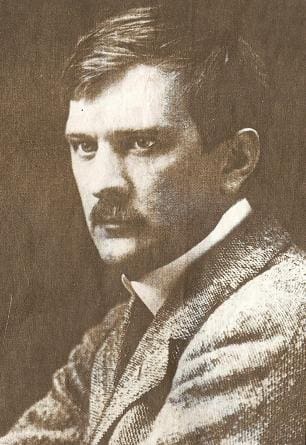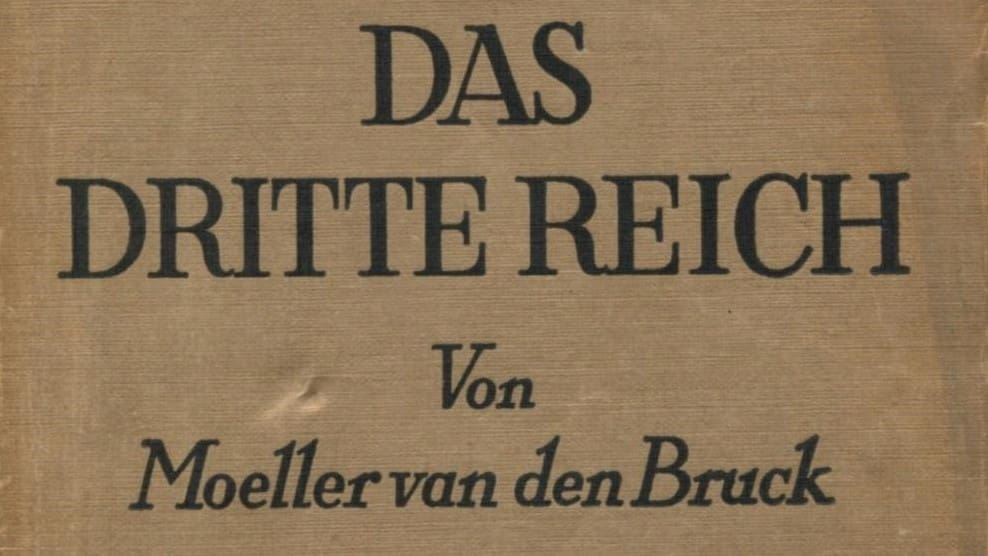The so-called ‘conservative revolution’ refers to a particular political–philosophical ideology and cultural–literary current that emerged between 1918 and 1933, the period between the First World War and the emergence of Nazi Germany.
The phenomenon of the conservative revolution, which is referred to in the literature as both the ‘German neo-conservative movement’ or ‘new nationalism’, had a significant impact on the intellectual atmosphere of the Weimar period. Some of the names associated with the movement, such as Moeller van den Bruck, Othmar Spann, Ernst von Solomon, Ernst Niekisch, or Edgar Julius Jung, have now been forgotten and are familiar only to scholars of German literature, political history, and philosophy. However, figures such as Ernst Jünger, who also became famous as a literary writer, Stefan George, who is regarded as one of the greatest German poets of the 20th century, and Oswald Spengler and Carl Schmitt, who are also artists and thinkers from the world of historical and political philosophy, are all part of the wider context of the ‘conservative revolution’. From the literary tradition, Hugo von Hoffmanstahl—one of the earliest users of the term—, Gottfried Benn, and the poet-philosopher Ludwig Klages were also associated with the conservative revolution. Thomas Mann, still widely read today, wrote in the wider context of this movement in the first half of his life as well and was a literary representative of the conservative revolution until his ideological turnaround in the early 1920s.
The concept of the conservative revolution was introduced to the academic world by Armin Mohler in 1950 with his doctoral thesis on German conservatism between the two world wars (Die konservative Revolution in Deutschland 1918–1932), while András Karácsony and Dezső Csejtei have written at greater length on the phenomenon regarding the aspects of Hungarian political science and history of ideas.
It is still a matter of debate whether the term ‘German conservative revolution’ can actually be used to describe a single unified tendency,
or whether it is merely a loosely connected set of political ideas, united above all by a common enemy (the ‘Weimar system’).
Yet, as Dezső Csejtei says, the use of the term has become established in the literature of political theory and the history of ideas.

The phenomenon of the conservative revolution was partly a consequence of the collapse of the German state (formed in the 19th century by Bismarckian ‘state-building’) after the First World War, and was born out of its internal and external crisis, its defeat in the war. In the broader context of ideological and political history, however, the conservative revolution, albeit a cataclysmic one, cannot be seen as the consequence of a single political event. In terms of its deeper intellectual roots, it was a distinctively German formulation of the Enlightenment’s political rationalism and its opposition to the ensuing secularization process. Conservative revolutionaries in general did not accept the idea of ‘organic development’ as formulated in Anglo-Saxon and American conservatism; rather, they considered the idea of continuity to be less applicable to the conditions on the continent, especially Germany, than in the island state and overseas. Most of them were more strongly opposed than the Anglo-Saxon conservatives to egalitarianism, any form of liberalism, and parliamentary democracy, which they associated with the ‘cultural spirit of the bourgeoisie’: all of this can be traced back to the specific cultural and philosophical thinking of German historical development as well as to what Fritz Stern called ‘cultural despair’ over the most characteristic socio-political phenomena and cultural trends of modernity.
The theorists of the conservative revolution were greatly inspired by Nietzsche, whom Thomas Mann described in his essay Russian Anthology as a synthesis of ‘conservatism and revolution’, but not all of them accepted Nietzsche’s contempt for Christian ethics. They were influenced by the anti-Enlightenment and anti-rationalist tendencies of German Romanticism—the ‘magical idealism’ of Novalis, Fichte’s idea of the absolute spirit, and the late Schelling’s philosophy of history—as well as by the vision of an organic society that emerged in the minds of Friedrich von Genz and especially Adam Müller. The militant nationalism of the Prussian military tradition had as much influence on the representatives of this movement as the ‘front line experience’ of the world war, with its glorification of sacrifice, heroism, and comradeship, and the constant presence of death and violence, which marked the tragic end of the ‘happy years of peace’ and the ‘long nineteenth century’.
The elemental experience of the First World War also reinforced scepticism about the idea of progress: the representatives of the conservative revolution were less likely to accept the idea of the linear development of humanity, preferring instead to think in terms of cultural cycles (see in particular Spengler’s ‘morphology of culture’) and the most significant civilizational and cultural trends of the 18th and 19th centuries were not clearly positively evaluated. The basic experience of the conservative revolution, which contrasted itself with the legacy of the French Revolution and the Enlightenment, was thus similar to the criticism of earlier conservatism of the Revolution and its outcomes, while one of its most fundamental characteristics was precisely that it did not seek to return to any previous order, and in particular, did not seek to restore the House of Hohenzollern and the relations of ‘Wilhelm’s Germany’ that had directly preceded 1918.
On the contrary, in the words of one of the leading figures of the movement Erik Moeller van den Bruck, it was considered ‘a conservative act to try to create things that are worth preserving’.

PHOTO: Wikimedia Commons
Therefore, in the case of the German conservative revolution, we cannot simply speak of a ‘reaction’ or a counter-revolution that results from the action of the forces of the previous, existing order. Above all, the aim was to create new forms and institutions that were coherent with the world as a hierarchical order and with a universal set of values that were expressed in the processes of world history as well as in the organization of society and the state. The term ‘Secret Germany’ (Geheimes Deutschland) originated in the ‘George circle’ around Stefan George, which referred to the image of a Germany untouched (and untouchable) by historical, economic, and political changes in an egalitarian direction. The phrase, which later became a symbol, was first used in many different contexts by Karl Wolskehl, a member of the circle, to describe George’s worldview and poetry, whose aristocratic intellectual perspectives not only created the French Enlightenment but also a line of cultural and metaphysical continuity rejecting the ideological foundations of the then ‘official’ Germany, the empire, that stretches from the spirituality of Greco-Roman antiquity through the Honenstaufen knighthood era to George’s modern poetry.
After the Second World War,
the conservative revolution in Germany was criticized above all for having been the founder of national socialism.
As early as 1933 Thomas Mann argued that ‘every conservative revolution leads to national socialism’. Mann’s interpretation was adopted both by opponents of the use of the term on purely scientific grounds (e.g. Stefan Breuer) and by ideological opponents of the conservative revolution.
However, more recent literature (András Karácsony, Rolf Peter Sieferle, Karlheinz Weißmann) argues that the assumption of continuity is a misleading simplification. As Sieferle puts it: ‘Seventy years on, the fronts are so close together that what today appears to be a single brown swamp was in its day a political area of fierce fighting.’
It is not worth denying, of course, that there really were and could have been points of contact between the representatives of national socialism and the conservative revolutionary movement, especially with regard to the enemy, the Weimar Republic. However, most conservative revolutionaries were alien to national socialist race theory, to Pan-German nationalism, and to the egalitarian and proletarian features which in some respects characterized the national socialist political programme and doctrine. Despite these significant differences, certain thinkers who could be classified within the broader ideological framework of the conservative revolution, such as Carl Schmitt, Martin Heidegger, or Alfred Baeumler, did indeed join the National Socialist Party when it seized political power in 1933, either out of conviction or out of career ambition. Others, however, such as Ernst Jünger or Othmar Spann, initially supported it, then became disillusioned and partly opposed it, and others, such as Oswald Spengler, Ernst Niekisch, or Edgar Julius Jung, felt antipathy towards the national socialist movement and ideology almost from the start.
Related articles:








